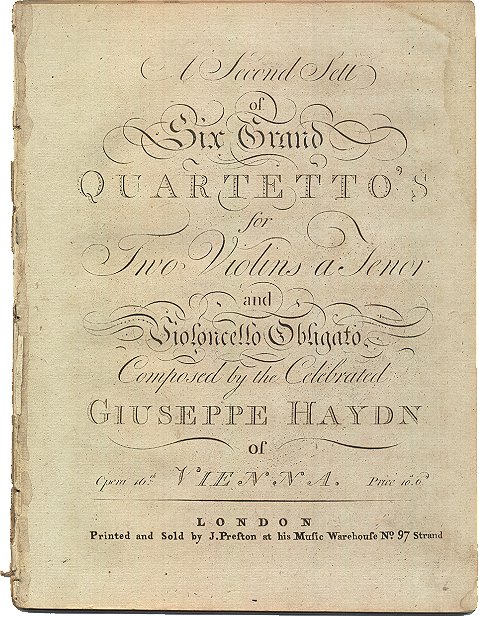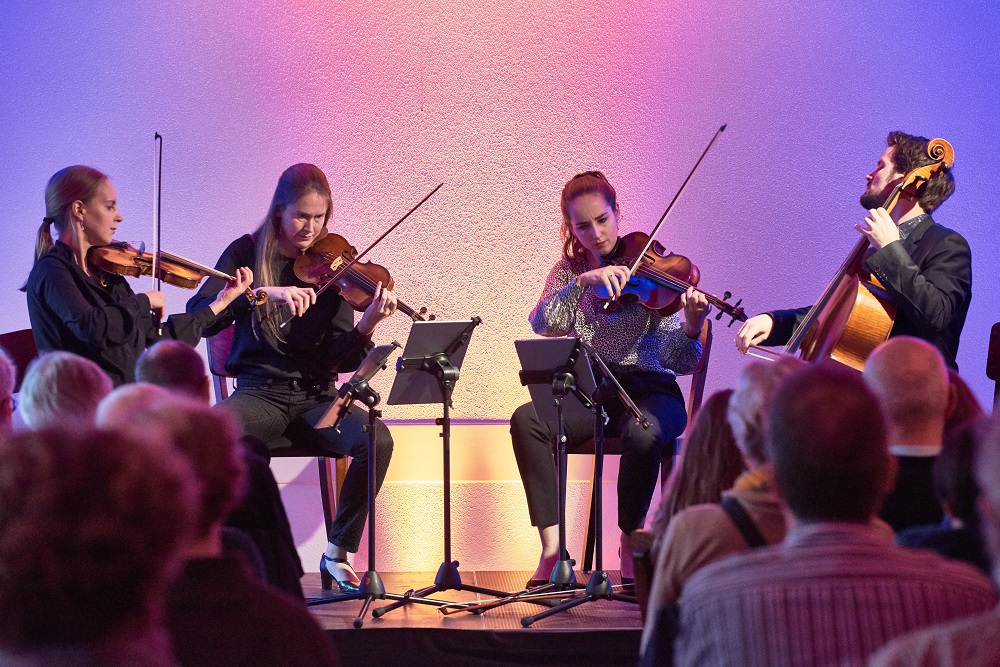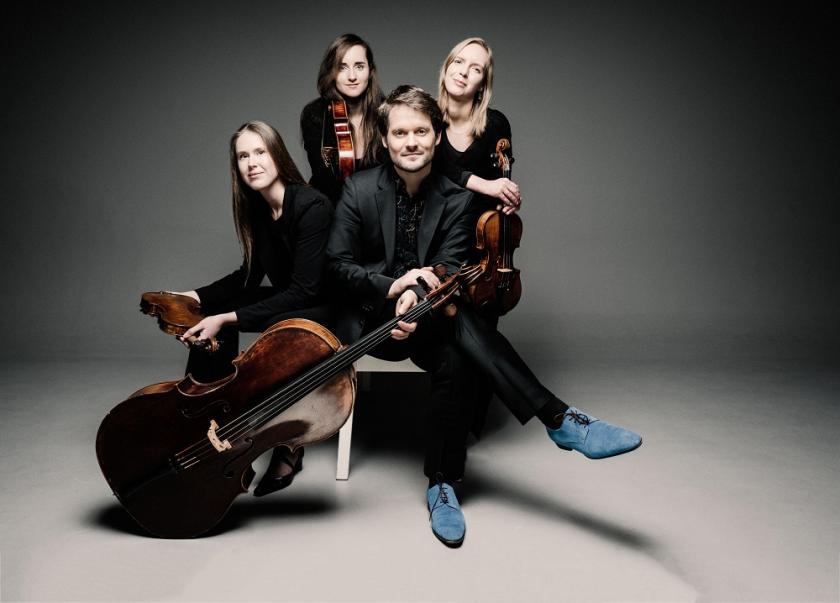As a string quartet, it’s not easy to distinguish yourselves from others. There are so many string quartets playing the great repertoire, and the level of quartets has never been as high as it is now. Everybody is trying to be unique.
We are all part of a very long string quartet tradition. We have so many examples of great string quartets, so many fantastic recordings, so many people that played the same pieces. If you really want to distinguish yourself as a string quartet, would it not it be clever to step away from the core repertoire, to look for other opportunities?
We have been thinking about this issue, and we eventually came to the conclusion that the answer is No. Or better, Yes and No.
The reason we play string quartet is that we want to share the heart of music with our audience. Music is communication, and the string quartet is the ultimate form of communication. We communicate with each other, but at the same time we communicate with our audience. And it doesn’t matter if we play something completely new, or one of the highlights of the string quartet repertoire. The thing is, how can we make this music speak to our audience, today? How can we give our listeners an experience they will not forget?
Of course, giving the audience a life-changing experience is a big dream, and it might not be a very realistic one. But, why would we not try, just like Beethoven did, to make the world just a bit more beautiful with music?
Our first few albums with Resonus Classics were based on the idea of combining music from all ages, with a particular theme. We combined Haydn and Ligeti, Mendelssohn and Weinberg. For example, on our last album, Solitude, we recorded pieces from the 15th to the 20th century that all had to do with the loss of loved ones. All pieces on this disc, from Josquin Desprez to Mieczyslaw Weinberg, contain a universal emotion we can all relate to.
 For our newest album we decided to follow a different path and focus on one composer. We chose Haydn’s Op 20 quartets. The choice for these quartets was a very clear one for us: these were the quartets that made us fall in love with the string quartet genre and they were the reason we decided to go for it and start a quartet life.
For our newest album we decided to follow a different path and focus on one composer. We chose Haydn’s Op 20 quartets. The choice for these quartets was a very clear one for us: these were the quartets that made us fall in love with the string quartet genre and they were the reason we decided to go for it and start a quartet life.
However, we have the feeling that Haydn’s music is too often regarded as a nice and relaxing opener for the rest of the concert. Many concerts that end with a dazzling Mendelssohn or Ligeti piece tend to take away the attention of Haydn’s music. Music that is loud, fast and apparently ‘difficult’, leaves a much bigger impression then subtle and refined music.
Of course, Haydn is loved very much by musicians. The more you play Haydn, the more you discover that this man created a whole universe of music, where everything exists. In his Op 20 quartets, every movement evokes a different atmosphere, a different emotion. Haydn writes about life in every aspect. In the remarkable Capriccio of Op 20 No. 2, it’s as if Orpheus descends in the underworld, surrounded by horrible furies. Then, suddenly, the atmosphere changes completely when Orpheus takes his lute and starts singing the most beautiful aria. This change of scenery within a single movement is something that was never done before. But Haydn never forced anything on his audience. On the contrary, he tries to make his music as comprehensible and transparent as possible. Three of his Op 20 quartets end with a fugue. In Haydn’s days, writing a fugue was something old fashioned, academic study material, too complicated for the modern listener. But Haydn, knowing this very well, instructed the musician in all three fugues to play sempre sotto voce with muted voice throughout. Each one of his fugues is masterfully constructed, but at the same time it’s a lively, humorous and intelligible conversation between four eloquent people.
We have been digging into these six quartets for at least a year, to find the treasures in Haydn’s music and what would be the best way to bring them out. Week after week, day after day, we spent hours on finding new ideas, throwing away ideas, finding cogent and convincing gestures, tempos and directions. The more we rehearsed, the more excited we became. This music is so incredibly inventive! Let’s take No. 2 again, where Haydn leaves out the first violin in the beginning and gives the first voice to the cello. Or No. 3, where the first violin and viola make a stormy entrée, followed very closely by the second violin and cello. Not to mention No. 5, with its breathtaking slow movement, where the first violin plays a wonderful free solo over the heartbeat played by the other instruments.  On our quest to discover the treasures in Haydn’s Op 20 quartets, we also started looking for classical bows. We heard about Luis Emilio Rodriguez Carrington, a Mexican bow maker living in Den Haag. Luis Emilio doesn’t just make you a bow. We started with long session of drinking coffee and talking about music, and about life. In the months that followed, we tried out several bows and shared our experiences. And finally, Luis Emilio built a bow for each of us that suited our instruments and our personalities perfectly. We were struck by the difference in sound and speaking quality of these bows. Playing with these bows makes the music so much more transparent and understandable (the Quartet pictured above by Salih Kilic).
On our quest to discover the treasures in Haydn’s Op 20 quartets, we also started looking for classical bows. We heard about Luis Emilio Rodriguez Carrington, a Mexican bow maker living in Den Haag. Luis Emilio doesn’t just make you a bow. We started with long session of drinking coffee and talking about music, and about life. In the months that followed, we tried out several bows and shared our experiences. And finally, Luis Emilio built a bow for each of us that suited our instruments and our personalities perfectly. We were struck by the difference in sound and speaking quality of these bows. Playing with these bows makes the music so much more transparent and understandable (the Quartet pictured above by Salih Kilic).
We went into the studio in Hilversum, to record with the British label Resonus Classics. Our first album [reviewed today on theartsdesk by Graham Rickson] contains the Op 20 quartets in G minor, C major and C minor. This album will concentrate on Haydn the dramatic composer. At the beginning of next April the quartets in D major, E-flat major and A major will be released. These quartets spotlight the optimism and humour in which Haydn is inimitable.
With these recordings we hope we can add a new voice to the collection of recordings that already exist, and to show once more why Haydn’s music is just the greatest of all.















Add comment